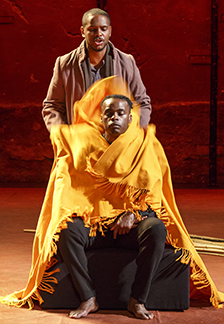By Lucy Komisar
Peter Brook‘s “Battlefield” is an elegant, moving and sad parable about justice and war, life and death, going back in our sophisticated times to the simple way earlier societies said these truths. It is inspired by the “The Mahabarata,” a stylized ritualistic vision of war from the epic Sanskrit poem dating from 400 B.C. which director Peter Brook staged in a 9-hour performance in 1987.
This 70-minute play is the end of the war, showing the suffering of the victors as well as vanquished. It is a morality play, a poetic parable of life and death, justice and war, addressed in a narrative about the victorious king and his family.

There are fields of dead corpses, women lamenting. The bare stage holds just a black box and some artfully casually thrown bunches of bamboo. The ground is a rust red cloth, matching the walls that were painted 30 years ago when BAM put on the first Mahabarata. At that time, BAM director Harvey Lichtenstein took over the Majestic movie theater and turned it into a ruined playhouse with crumbling brown and cream walls to fit the devastation told by the tale.
The characters wear black robes or colorful fringed blankets in red and gold; they are barefoot. A drummer (Toshi Tsuchitori) plays on a skin drum.
The defeated blind King Dritarashtra (Sean O‘Callaghan) laments. But his brother Vidura tells him, “The destruction of your sons was inevitable, you knew that and yet you refused to listen to us when we asked you, “Stop that massacre.”
The new king, Yudishtira (Jared McNeill), his nephew, has been triumphant in battle and will become ruler. His mother Kunti (Carole Karemera) asks him to do the funeral oblation for the defeated enemy, Karna. She says he was of noble birth.

Then the joy in victory is diminished when she says that Karna, who he killed, was his half-brother, from her impregnation by a god. And she acknowledges, “My son was cruel. His egoism was insatiable. Had only one word on lips, war.”
Duryiodhana (Ery Nzaramba), son of the old king, will lose his life.
So this is a primitive long ago place/society. But maybe not so much.
Earth has been ruined. Destruction comes on tiptoe. Death is not peace. The god Krishna tells the new king that the Earth needs a calm and just king, but that his choice will be between a war and another war.
Now, Dritarashtra says, “My son was cruel, his egoism was insatiable, it had no limits. He had only one word on his lips, “war.” Some of the language seems pedantic. Yudishtira asks, “Can peace of mind be found when I have been the instrument of all that massacre?”

Other times it‘s philosophical. Death (Ery Nzaramba) declares, “More than everyone I have no free will. If you have to blame somebody blame the real responsible Time.” But Time arrives and says the fault is Destiny.
In these African tales of myth and magic, parables of a snake, a pigeon, a worm and a mongoose play roles. Wild animals invade the country. The old king and the new king‘s mother walk into the fire of death.
But essentially, this is a political play. Grandfather Bishma urges, “Yudishtira, protect your people, protect the poor. Do not accept to make wars. Let peace be your aim.”
The words seem plain, but the cool almost choreographed production by long-time collaborators Brook and Marie-Hél¨ne Estienne provide an elegance that turns the play into poetry.
“Battlefield.” Based on the Mahabharata and the play by Jean-Claude Carri¨re; Adapted and directed by Peter Brook and Marie-Hél¨ne Estienne. Brooklyn Academy of Music, Harvey Theater, 651 Fulton St., Brooklyn. 718-636-4100. Opened Sept 28, 2016; closes Oct 9, 2016. 10/6/16.

